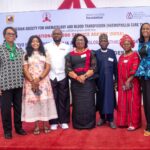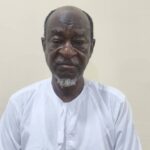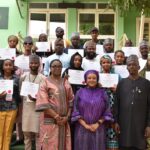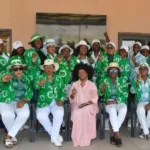By Kevin Okunzuwa, News Agency of Nigeria (NAN)
“I won’t accept this rubbish and I won’t allow it lying low“, Miss Mercy Igiose, fumed as she faced Mr Johnson Giwa, the estate agent.
Giwa is trying to pacify her to accept the refund of her payment for a two-bed room apartment.
The reason for the refund and refusal to rent out the apartment to her, according to Igiose, is because she is an albino and Chief Amos Iyase, her landlord does not want to have an albino as his tenant.
Igiose, lived up to her vow, by filing a case based on breach of trust, unlawful denial and infringement of her fundamental human right against the landlord and his agent at the High Court, which she eventually won.
Igiose’s case is one of the many cases of violence against women and girls, especially Persons with Albinism (PWA) in Nigeria.
Experts say Albinism is a rare genetic disorder where you aren’t born with the usual amount of melanin pigment.
Melanin is a chemical in your body that determines the color of your skin, hair and eyes. Most people with albinism have very pale skin, hair and eyes.
People with this type of health condition are often referred to as `Albinos’ or simply “Persons with Albinism (PWA).
Worried by the situation, the Nigerian Government in 2013 formulated the national policy on PWA.
The then Minister of Education, Mallam Adamu Adamu, under whose supervision the national policy on albinism was formulated, said it was in response to the numerous challenges encountered by PWAs in their daily lives.
He had said: “In Nigeria, the socio-cultural system with its inherent myths and beliefs has put PWAs at a low stratum in all spheres of life.
“PWAs experience psychological challenges due to stigmatisation, discrimination and segregation.
“Prior to the implementation of the policy, it was common place to see PWA denied the chance to go to school, get a job, have a family and often face discrimination for their entire lives, simply because of their appearance.
The policy seeks not only to protect PWAs from discrimination but also seeks to maximise the talents.
“This policy is intended to improve the status of PWAs by harnessing their full potentials and guaranteeing equal access to education, social, health, economic and political opportunities.
“It is multi-sectorial and provides a holistic approach to improving the standard of life of PWAs. The Policy is aimed at mainstreaming albinism into every sector of development in Nigeria.
“Based on the issues stated above, the rights of persons in this group cannot be disregarded. It is hoped that effective implementation of this policy and its guidelines will guarantee improved conditions of life for PWAs,’’ Adamu said.
Unfortunately, in spite of the policy the likes of Iyase, are rather stuck to their stigma and discrimination against PWAs.
Sadly, these cases are either not reported as the victims simply keep mute as they seek not to aggravate an already bad situation.
The Albino Foundation of Nigeria, an NGO, says only about 12 attacks against people with albinism had been reported in the nation. “Yet, bullying and name-calling are common for children with albinism,’’ it said.
It is against the backdrop that the Initiative for Advancement of the Albinism Cause (INAAC), an NGO, recently held an enlightenment workshop in Benin, the capital city of Edo.
The convener, Miss Joy Odigie, Executive Director, INAAC, said the workshop was meant to increase awareness about the plight of PWA, especially women, girls, and mothers.
This, Odigie said, would equip them with knowledge and skills on how to deal with the challenges they are faced with, especially those fuelling Gender Based Violence (GBV).
The workshop had as its theme: “Preventing Gender Based Violence against Women and Girls with Albinism and Mothers of Children with albinism in Benin City, Edo State.’’
According to Odigie, women and girls with albinism, especially mothers of children with albinism, face numerous challenges and risk becoming victims of gender-based violence.
“Such women suffer not only from discrimination and stigmatisation, but also face physical and emotional abuse, sometimes leading to loss of life.
“We have also heard about a case of job denial as a result of skin colour and also refusal to give out an apartment for rent because the family has a child with albinism.
“The myth that persons with albinism have supernatural powers and that they can be used for rituals still hold strong in some parts of Edo,’’ she said.
According to her, any form of violence targeted against women and girls with albinism is a human rights violation, and perpetrators should be punished.
“Women and girls with albinism are humans and, as such, deserve fair treatment from members of the society,’’ she said.
“This workshop organised, with support from the Nigerian Women Trust Fund, is to ensure equality and inclusion of women and girls with albinism as well as mothers of children with albinism, to protect their human rights and prevent gender-based violence,” she said.
Some stakeholders blame the plight of albinos on cultural practices and myths.
Mr Olumide Dosumu, Edo Coordinator, National Human Rights Commission (NHRC), says one of the myths claims that having sex would an albino could cure HIV/AIDS.
He, therefore, attributed the cases of rape against albinos to this misconception.
“It is unfortunate that this has led to the infection of many women with albinism, thereby deteriorating their health condition and psychosexual feeling.
“Sexual based violence against them makes the case a double tragedy,” he said.
Persons with albinism, the NHRC boss said, were susceptible to killing for ritual because of the myth that they were potent tool.
He, however, regretted that these vulnerable persons suffered discrimination in the society in spite of the abundant laws and documents that guaranteed their rights in the society.
“Women and girls with albinism have equal rights and opportunities opened to them just like any other citizen.
“There must be assertiveness in demanding for their rights and inclusiveness; there must be well groomed knowledge on issue content of GBV.
“Persons with albinism must see themselves as human beings and citizens because the Nigerian constitution has guaranteed their rights,” he said.
Similarly, Mrs Agatha Isieke, Executive Director, Women, Youths and Children Advancement Programme, identified society’s attitude towards practices of gender discrimination as the root cause of GBV.
She said understanding these contributory factors would help uncover necessary steps to take in addressing the menace.
No wonder, stakeholders hived sigh of relief and described as hearth warming, the Minister of Women Affairs, Mrs Uju Kennedy-Ohaneye’s recent disclosure of the constitution of a mobile court to try GBV cases.
The minister, at a news conference in Abuja, said the plan was aimed at increasing the visibility of the activities of the ministry in dealing with SGBV issues.
Kennedy-Ohaneye said that among the suspects to be arraigned are those still practicing female genital mutilation (FGM).
Others, she said, suspected offenders against PWA, adding that the aim was to put an end to the offensive and obnoxious old traditional practice nationwide.
The minister said the board of directors of the ministry had given its tacit support to the ministry’s avowed determination of giving women a voice in the society.
“This will be done in line with Mr President’s renewed hope agenda”, saying that they would work to allow the poor to breathe and not to be suffocated,” she said.
According to her the prosecution of suspects will be in collaboration with the Federal Ministry of Justice, Attorney General of the Federation, Ministry of Justice, Nigeria Governor’s Forum, Civil Society Organisations (CSOs) and security agencies.
She said partnering with other organisations was to have an innovative way to enforcing the Violence Against Persons Prohibition (VAPP) Act 2015, and other laws to guide against SGBV, GBV PWA, and FGM among others.
For Odigie, “the minister’s statement is refreshing and promising. But it is expected that government will go beyond rhetoric and effectively implement VAPP Act 2015.
It is also incumbent on the media to dispel the misinformation about albinos through factual reportage of whom they are and the challenges they face in the society. (NANFeatures) (nannews.ng)
**If used please credit the writer and News Agency of Nigeria.












